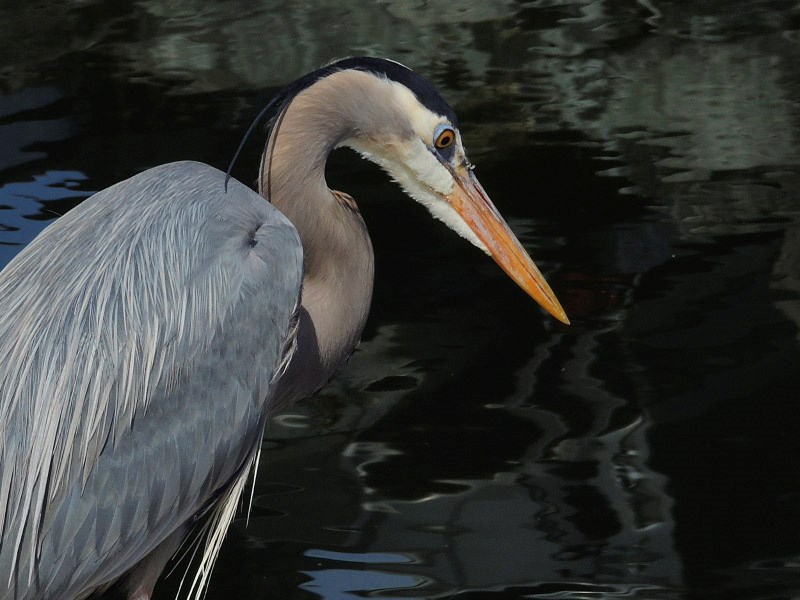Mayor Skeels’ recent comment about herons got my attention. “If you’re going to have herons in the middle of downtown,” he said in council, “it doesn’t matter how much you write. People are going to say, this is crazy. And you’re going to say yes it is, welcome to Bowen Island…They rule us.”
Isn’t this what we love about Bowen? That our hearts are big enough to care for another species? That we’re willing to tiptoe around their nurseries? Makes us feel good to value and protect something so ancient and so seemingly unlike us.
Of course, it’s the law. In B.C. the Great Blue Heron is protected by the province’s Wildlife Act. Heron populations continue to be threatened by Eagle’s enormous appetite, and the capacity of humans to make such a racket that Mom and Pop Heron leave their nest.
We’re not all that unusual in our efforts to protect another species. A friend told me about her first visit to Ireland. She’s of Irish descent and looked forward to a reconnection with her roots. On the cab from the airport, she noticed that the road, which was perfectly straight, took a sudden jog around a tree. “Fairies,” the cab driver told her. We value our herons; and the Irish value their fairies.
In 1968, the people of the town of Ballymagroartyscotch, Ireland, were outraged when a proposed road included cutting down a fairy tree. The contractors were reluctant to destroy the tree. The story that spooked everyone was the one about the chap with the electricity board. He cut down a fairy tree, and the next day he fell off an electricity pole and died. Eventually, the road was diverted. In another example, a fairy mound (sidhe) was discovered to be in the way of a planned airport in Ireland; builders wouldn’t touch it. The airport sidhe became the focal point of intense controversy before the builders bypassed it. It’s crazy. Welcome to Ireland.
Closer to home, other communities have discovered how to live in harmony with their wild things. The community of Whistler is home to ten thousand residents, more than two million annual visitors, and about one hundred black bears. They are learning to live together thanks to the Get Bear Smart Society (GBS).
Over the last two decades, GBS has taken a leadership role in Whistler’s ongoing transformation into a Bear Smart community. They work with town officials, provincial conservation officers and bear managers, community and business leaders, waste management service providers, the RCMP, bear biologists, and concerned residents. They focus on public education, and train law enforcement officials and bear managers how to use non-lethal bear management options.
We are fortunate on Bowen to have an enormous diversity of wildlife. Oh sure, the deer wreak havoc in the gardens and the rats get into the house in winter. We all have our challenges. My current challenge is to live in peace and tranquility with the slugs. My first impulse when I see them nibbling at my lettuce is to grab a trowel and stab them, brutalizing for both of us. The more I educated myself, the more I realized they play an important role in the Earth’s ecology. They process superficial organic wastes, and break down organic material to make these nutrients available to plant roots. Okay but do that processing somewhere else, please.
I looked to the Compassionate Action Institute site for advice: “Education and compassion are the keys to coexisting with any form of wildlife. As wild animals find their natural environment shrinking daily, their interaction with humans increases with disastrous results for the animals. When they take up residence in someone’s home, destroy the garden, rummage through garbage cans or raid the songbird feeder, they are just looking for a place to live. They don’t deserve to be killed for such actions.” They suggest we humanely encourage them to move elsewhere.
When a biologist friend told me you could throw slugs quite a distance without harming them, I discovered my non-lethal slug management option. Early in the morning, I grab a sweater, put on my gardening gloves, go to the garden, pick up those slimy little earth- processors, carry them up the hill and toss them gently into the forest, accompanied by the sweet sounds of the dawn chorus. This hardly qualifies me for a Jane Goodall Award, but both the slug and I feel better.
If Whistler can co-exist with bears, surely I can live with slugs, and we can continue to live in peace with the ancient, prehistoric call of the gentle heron and the wonderful sight of these birds in flight.
Pauline Le Bel is an Emmy-nominated screenwriter, award-winning novelist and the author of Becoming Intimate with the Earth.



